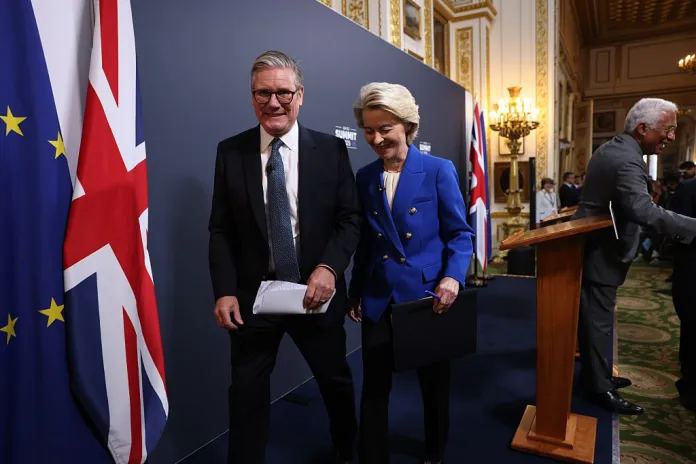“Name a single Brexit benefit!” People have been making the demand for ten years now, rarely in good faith. I quickly learned that the only useful response is, “Do you actually want me to list some Brexit benefits, or are you waiting for me to get three words into my answer before jumping in to tell me what an idiot I was to have voted Leave?”
In fact, the biggest Brexit benefits are often negative. The United Kingdom has been free to stand aside from some of the crazier and more expensive regulations adopted by the European Union since January 2021. For example, it has not had to pay into the post-COVID-19 recovery fund, a racket for politically-connected rent-seekers. It has not had to adopt the 9,000 regulations decreed by Brussels since Brexit.
True, some of these 9,000 regulations are relatively trivial. It is satisfying that the UK does not need to apply the absurdly low 50 euro limit to use contactless cards, but I am not going to claim that that small convenience is boosting the British economy.
Others, though, are of vast consequence, and none more so than those dealing with the internet. The very existence of the World Wide Web, lacking as it does any central control, is an affront to the tidy-mindedness of the Eurocrat. In an attempt to impose its will on what it sees as an unregulated online jungle, the EU has adopted a series of heavy-handed laws: the Digital Markets Act, the Digital Services Act, the AI Act, the Data Act.

If you buy an Apple phone in the EU, it will come without certain features that are available in the United States, Britain and everywhere else, such as Apple Intelligence and iPhone mirroring. Nor does the U.K. have to follow EU’s nannying rules on driver-assist tech in cars, including automatic emergency braking, drowsy driver alerts, and driver-facing cameras, which have raised concerns about Chinese spyware. And that is before we get to the talk in Brussels of a “democracy shield” around social media — in other words, censorship.
Now you might expect me, as the fellow who founded Vote Leave, to be taking this line. But plenty of European business leaders are saying the same thing. “Europe is unnecessarily delaying its AI future with excessive regulation,” says Stefan Hartung, the CEO of Bosch. “We will regulate ourselves to death, because we are trying to regulate against technological progress.”
The French and German heads of government are belatedly coming round to his view. At a summit this month, Emmanuel Macron and Friedrich Merz called for the EU to roll back some of its rules, including its especially intrusive data privacy laws, known as the General Data Protection Regulation (GDPR). They also suggested it making it easier for companies to use data to train AI, in line with what happens in the US.
Remarkably, even Eurocrats verbally acknowledge the problem, and talk of “cutting red tape”. The trouble is that they are institutionally incapable of doing it. Their positions exist for the promotion of closer integration. In Brussels, it is an article of faith that Europe must be more closely united so as to be able to punch its weight against the U.S.
“Our start-ups and small businesses are often held back by layers of rigid rules,” says the relevant European Commissioner, a perfectly amiable Finn called Henna Virkkunen. Yet we get a glimpse of the problem in her title, “Executive Vice-President for Tech Sovereignty, Security and Democracy.”
Innovation cannot be decreed by politicians. Innovation happens when politicians get out of the way. When I was a newly elected Member of the European Parliament in 1999, the EU was in the process of adopting something called “the Lisbon Agenda”, which was going to give it “the most competitive and dynamic knowledge-based economy in the world” by 2010. Since that goal was adopted, the U.S. economy has grown around two-thirds, again as fast as that of the EU. Per capita GDP, which was comparable in 2000, is now 38 per cent higher in the U.S., and the average American worker is as productive as two Europeans.
Why? Not because of anything U.S. leaders have done but, on the contrary, because of what they have not done. They have not increased spending or taxation in the way Europeans have. They have not over-regulated their private sector as badly. They have not artificially raised the price of energy.
Britain, which is currently negotiating a tech and AI treaty with the U.S., has the chance to do something similar. Brexit can make the British economy less European and more American. It is hard to imagine a bigger benefit than that.
